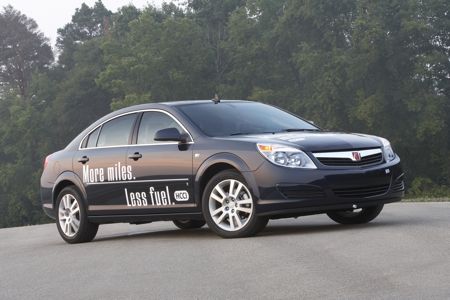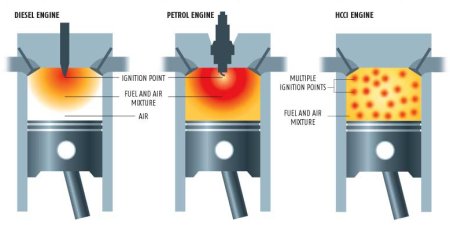 All Entries Tagged With: "hcci"
All Entries Tagged With: "hcci"
HCCI – Pros, Cons, and Predictions
Is Homogenous Charge Compression Ignition (HCCI) the next big thing for the auto industry? Will it be the perfect marriage of low emissions, high fuel economy, and performance? Probably not, but it very well could be a significant transition, that first step to pry us out of our gas-slurping speedsters without an insurmountable culture shock. [This is a follow-up to our article on HCCI from last week, Emerging Engine Technology – HCCI – What is it? Give it a read if you haven’t already or a lot of this won’t make sense.]

Saturn Aura with an HCCI engine.
In today’s auto market, a combination of desperation and advanced engine management systems has solved a lot of HCCI’s inherent problems. In May 2008, GM rolled out a Saturn Aura HCCI prototype, a hybrid of HCCI and traditional spark-ignition that delivers 15-percent gas savings with a 4-cylinder, 2.2-liter engine rated at 180 hp.
The response to the technology and the Aura is mixed. The greens don’t think it goes far enough in fuel savings and question the industry’s obsession with fossil-fuels. The performance side looks at the horsepower rating and sneers. So, let’s try to bridge the gap with the tried-and-true Pro and Con evaluation:
Emerging Engine Technology – HCCI – What is it?
Engineers started fiddling around with HCCI (Homogeneous Charge Compression Ignition) in the late 1970s. While the possibilities that HCCI offered were intriguing (especially the fuel economy savings), the technology was too complicated for the time. HCCI research was relegated to the back shelf – until recently when the search for more efficient, eco-friendly gas-sipping engines became priority number one for the auto industry.
HCCI could very well be, if not THE answer to our gas price and oil consumption woes, at least a serious transition from current technology to some sort of future non-fossil fuel engine. What it is requires a little more explanation, and that explanation starts with what HCCI isn’t.

HCCI graphic from New Science magazine 2006.
With conventional gas engines, ignition of the fuel/air mixture is achieved with a spark.

